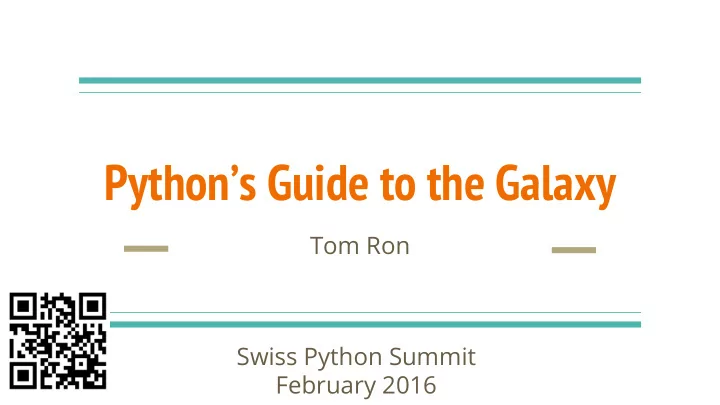

Python’s Guide to the Galaxy Tom Ron Swiss Python Summit February 2016
Tom Ron - Senior Data Scientist @ Magic Internet - Geek - Python Developer - Mostly Harmless https://github.com/tomron/python_swiss_2016
Agenda - trilogy in 4 parts Data Structures -collections, itertools ● Dates - time, datetime ● Text - string, unicode, re ● And more ●
Data Structures Collections namedtuple() factory function for creating tuple subclasses New in version 2.6. with named fields deque list-like container with fast appends and pops New in version 2.4. on either end Counter dict subclass for counting hashable objects New in version 2.7. OrderedDict dict subclass that remembers the order New in version 2.7. entries were added defaultdict dict subclass that calls a factory function to New in version 2.5. supply missing values
collections from collections import from collections d = {} defaultdict import Counter d[42] += 1 d = defaultdict(int) d = Counter() d[42] += 1 d[42] += 1 defaultdict(<type 'int'>, {42: 1}) Counter({42: 1}) KeyError: 42
collections d = {1 : 20} from collections import e = {1 : 22} Counter d + e d = Counter({1 : 20}) e = Counter({1 : 22}) TypeError: unsupported d + e operand type(s) for +: 'dict' and 'dict' Counter({1: 42})
iterating books = ["The Hitchhiker's Guide to the Galaxy" , "The Restaurant at the End of the Universe" , "Life, the Universe and Everything" , "So Long, and Thanks for All the Fish" , "Mostly Harmless" , "And Another Thing..." ] for index, book in enumerate(books, 1): print "\"%s\" is the %s book"%(book, index) "The Hitchhiker's Guide to the Galaxy" is the 1 book "The Restaurant at the End of the Universe" is the 2 book "Life, the Universe and Everything" is the 3 book
iterating publish_years = [1979, 1980, 1982, 1984, 1992, 2009] for book, year in zip(books, publish_years): print "%s was published in %s"%(book, year) The Hitchhiker's Guide to the Galaxy was published in 1979 The Restaurant at the End of the Universe was published in 1980 Life, the Universe and Everything was published in 1982
itertools Infinite iterators count, cycle, repeat Iterators terminating on the chain, compress, dropwhile, groupby, ifilter, ifilterfalse, shortest input sequence islice, imap, startmap, tee, takewhile, izip, iziplongest Combinatoric generators product, permutations, combinations, combinations_with_replacement
itertools from itertools import takewhile books_publish_year = zip(books, publish_years) # All books published before 1900 # Assuming books are sorted books_before_1990 = takewhile( lambda (book, year): year < 1990, books_publish_year) [The Hitchhiker's Guide to the Galaxy, The Restaurant at the End of the Universe, Life, the Universe and Everything, So Long, and Thanks for All the Fish]
itertools # Taking 2 books for to read on my vacation from itertools import combinations for book1, book2 in combinations(books, 2): print "\"%s\"\t\"%s\""%(book1, book2) "The Hitchhiker's Guide to the Galaxy" "The Restaurant at the End of the Universe" "The Hitchhiker's Guide to the Galaxy" "Life, the Universe and Everything" "The Hitchhiker's Guide to the Galaxy" "So Long, and Thanks for All the Fish" "The Hitchhiker's Guide to the Galaxy" "Mostly Harmless" "The Hitchhiker's Guide to the Galaxy" "And Another Thing..." "The Restaurant at the End of the Universe""Life, the Universe and Everything" ...
itertools # But which one should I read first? from itertools import permutations for book1, book2 in permutations(books, 2): print "\"%s\"\t\"%s\""%(book1, book2)
itertools # group by - books by decades from itertools import groupby for decade, gr in groupby(books_publish_year, lambda x: 10*(x[1]/10)): print decade, ";".join(["\"%s\""%(g[0]) for g in gr]) 1970 "The Hitchhiker's Guide to the Galaxy" 1980 "The Restaurant at the End of the Universe";"Life, the Universe and Everything";"So Long, and Thanks for All the Fish" 1990 "Mostly Harmless" 2000 "And Another Thing..."
Dates time - Time access and conversions datetime - Basic date and time types, dates manipulations calendar — General calendar-related functions
Datetime from datetime import datetime # from string my_time = '2016-02-05 09:37:11' d = datetime.strptime(my_time, "%Y-%m-%d %H:%M:%S") datetime.datetime(2016, 2, 5, 9, 37, 11) # to string d.strftime("%Y-%B-%d %H:%M:%S") 2016-February-05 09:37:11
Datetime from datetime import timedelta delta = timedelta(hours=1) time_in_1_hour = now + delta print now 2016-01-31 17:07:03.080847 print time_in_1_hour 2016-01-31 18:07:03.080847
Datetime and_now = datetime.now() # who much time passed? time_diff = and_now - now print "time_diff: %s" %time_diff time_diff: 0:00:00.000088 print "time_diff.seconds: %s" %time_diff.seconds time_diff.seconds: 0 print "time_diff.total_seconds: %s" %time_diff.total_seconds() time_diff.total_seconds: 8.8e-05
Datetime tomorrow = now + timedelta(days=1) time_diff_tomorrow = tomorrow - now print "time_diff_tomorrow: %s" %time_diff_tomorrow time_diff_tomorrow: 1 day, 0:00:00 print "time_diff_tomorrow.seconds: %s" %time_diff_tomorrow .seconds time_diff_tomorrow.seconds: 0 print "time_diff_tomorrow.total_seconds: %s" %time_diff_tomorrow . total_seconds() time_diff_tomorrow.total_seconds: 86400.0
Text print 'zürich' # -*- coding: utf-8 -*- print 'zürich' SyntaxError: Non-ASCII zürich character '\xc3'
Text string - plain sequence of bytes, default ASCII ● unicode - , str := unicode in Python 3 ●
Text # -*- coding: utf-8 -*- 2 len('ü') 1 len(u'ü') 2 len(u'ü'.encode('utf-8')) 1 len(u'ü'.encode('latin1')
RE import re sentence = "\"The Hitchhiker's Guide to the Galaxy \" was published in 1979" regex = "\"([\w ']+)\" was published in ( \S+)" [("The Hitchhiker's Guide to the Galaxy", '1979')] re.findall(regex, sentence)
RE match1 = re.match(regex, sentence) ("The Hitchhiker's Guide to the Galaxy", '1979') match1.groups() The Hitchhiker's Guide to the Galaxy match1.group(1) (1, 37) match1.span(1) {} match1.groupdict()
RE match2 = re.search("\"(?P<book>[\w ']+)\" was published in (? P<year>\S+)", sentence) ("The Hitchhiker's Guide to the Galaxy", '1979') match2.groups() The Hitchhiker's Guide to the Galaxy match2.groups() (1, 37) match2.span(1) {'book': "The Hitchhiker's Guide to the Galaxy", 'year': match2.groupdict() '1979'}
And.. - Reading data from web (urllib, urllib2) - Async - Profiling - More about text
So long, as Thanks for All the Fish
Recommend
More recommend